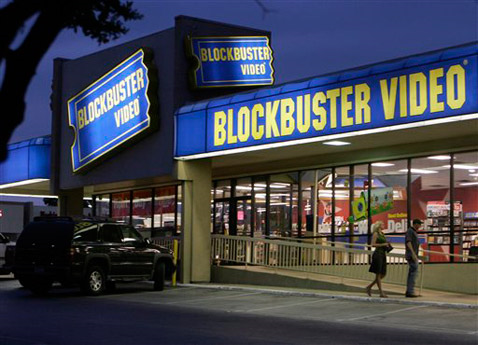Should The Fed Bail Out Blockbuster?
December 18th, 2011This week I arrived in my native Nashville, Tennessee after a year away from home traveling throughout this country and abroad. One thing that hasn’t changed about one of my favorite cities in the world is that I’m still allergic to it (*pops another antihistamine*). But quite a few things have changed in just one year. Sitting down to lunch with my family today, my father started asking me questions about Netflix and informed me that there isn’t a single Blockbuster store left in Nashville. They’ve all gone out of business and closed down. In the last year I’ve seen closed down Blockbuster locations all over the United States from Michigan to Virginia, so I wasn’t too surprised to hear that Nashville is now bereft of Blockbusters.
Now when Blockbuster first started, it was an incredibly innovative business concept. Its founder imitated a lot of the distribution and franchising models that made McDonald’s an international fast food success, but applied these to video rental stores. But as we’re all seeing, a business model that created so much value and became such a stellar success beginning in the 1980s, just doesn’t create enough value to remain competitive in the 2010s. It’s been killed off by more efficient and cost-effective business models like RedBox and Netflix, which create more value for their customers by providing cheaper video rentals with a lot more convenience. Yet Blockbuster’s destruction means its employees are losing their jobs and its investors are losing their profits. Should Blockbuster get a bail out?
Why not? The Fed has bailed out so many financial companies by shoring up their budgets with easy loans of millions of dollars at killer interest rates. Many people consider these bail outs necessary because they help keep companies that employ Americans in business– they prevent the painful economic destruction that we hate to see. No one likes losing their job and no one likes seeing others lose their jobs (except for maybe corporate executives that get fat bonuses when they lay people off). So why not bail out Blockbuster? Give them a few million at low or no interest so they can get back on their feet, come up with a plan to stay competitive, and make a huge come back? Because the destruction is only part of what’s happening.
Blockbuster is falling apart, as explained above, because its business model is no longer effective. Blockbuster does not employ its investors’ capital in the most productive way that creates the most value. Competitors have provided Blockbuster’s service better than Blockbuster does and at a better price too! Continuing to pour capital into Blockbuster would be like flushing it right down the toilet. The “destruction” that happens in the marketplace isn’t really destruction at all. It’s the reallocation of resources from their less productive uses to more productive uses. As Blockbuster goes under, its assets and the capital that would be invested in it go somewhere else, somewhere that will enable them to produce more value– and more jobs that are more sustainable– than they would have in Blockbuster.
Financial institutions like big banks are no different. If they begin to fall apart, if they need hastily scrapped together loans at impossibly low interest rates that no sane creditor would actually lend them unless it had an unlimited capacity to create money out of thin air, then they are failed business models that no longer create enough value to justify their continued existence. The capital would employ more people and create more value in another bank or company. In short: if a business needs a bailout, that’s the precise reason that it shouldn’t get one.
Nobody is hollering for a Blockbuster bailout because they can clearly see how its model is no longer effective at producing the best results for the money. But the minute we leave video rentals alone and begin talking about something as mystified and important as capital markets, people suddenly lose their sense of perspective and ability to reason. The irony is that it’s precisely the importance of capital markets that make it all the more necessary for us not to let their failed business models drain resources while better companies would create more value for us all.
Don’t forget to visit our official website to learn more about the Silver Circle Movie:http://SilverCircleMovie.com


